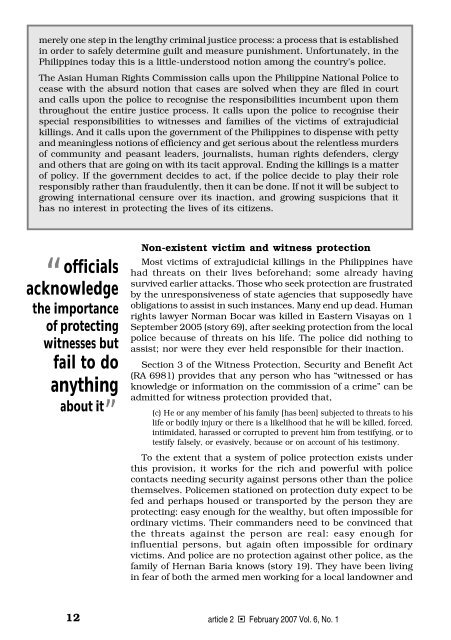of the Philippines the criminal justice system is - Article 2
of the Philippines the criminal justice system is - Article 2
of the Philippines the criminal justice system is - Article 2
You also want an ePaper? Increase the reach of your titles
YUMPU automatically turns print PDFs into web optimized ePapers that Google loves.
merely one step in <strong>the</strong> lengthy <strong>criminal</strong> <strong>justice</strong> process: a process that <strong>is</strong> establ<strong>is</strong>hed<br />
in order to safely determine guilt and measure pun<strong>is</strong>hment. Unfortunately, in <strong>the</strong><br />
<strong>Philippines</strong> today th<strong>is</strong> <strong>is</strong> a little-understood notion among <strong>the</strong> country’s police.<br />
The Asian Human Rights Comm<strong>is</strong>sion calls upon <strong>the</strong> Philippine National Police to<br />
cease with <strong>the</strong> absurd notion that cases are solved when <strong>the</strong>y are filed in court<br />
and calls upon <strong>the</strong> police to recogn<strong>is</strong>e <strong>the</strong> responsibilities incumbent upon <strong>the</strong>m<br />
throughout <strong>the</strong> entire <strong>justice</strong> process. It calls upon <strong>the</strong> police to recogn<strong>is</strong>e <strong>the</strong>ir<br />
special responsibilities to witnesses and families <strong>of</strong> <strong>the</strong> victims <strong>of</strong> extrajudicial<br />
killings. And it calls upon <strong>the</strong> government <strong>of</strong> <strong>the</strong> <strong>Philippines</strong> to d<strong>is</strong>pense with petty<br />
and meaningless notions <strong>of</strong> efficiency and get serious about <strong>the</strong> relentless murders<br />
<strong>of</strong> community and peasant leaders, journal<strong>is</strong>ts, human rights defenders, clergy<br />
and o<strong>the</strong>rs that are going on with its tacit approval. Ending <strong>the</strong> killings <strong>is</strong> a matter<br />
<strong>of</strong> policy. If <strong>the</strong> government decides to act, if <strong>the</strong> police decide to play <strong>the</strong>ir role<br />
responsibly ra<strong>the</strong>r than fraudulently, <strong>the</strong>n it can be done. If not it will be subject to<br />
growing international censure over its inaction, and growing suspicions that it<br />
has no interest in protecting <strong>the</strong> lives <strong>of</strong> its citizens.<br />
<strong>of</strong>ficials<br />
acknowledge<br />
<strong>the</strong> importance<br />
<strong>of</strong> protecting<br />
witnesses but<br />
fail to do<br />
anything<br />
about it....<br />
“<br />
”<br />
Non-ex<strong>is</strong>tent victim and witness protection<br />
Most victims <strong>of</strong> extrajudicial killings in <strong>the</strong> <strong>Philippines</strong> have<br />
had threats on <strong>the</strong>ir lives beforehand; some already having<br />
survived earlier attacks. Those who seek protection are frustrated<br />
by <strong>the</strong> unresponsiveness <strong>of</strong> state agencies that supposedly have<br />
obligations to ass<strong>is</strong>t in such instances. Many end up dead. Human<br />
rights lawyer Norman Bocar was killed in Eastern V<strong>is</strong>ayas on 1<br />
September 2005 (story 69), after seeking protection from <strong>the</strong> local<br />
police because <strong>of</strong> threats on h<strong>is</strong> life. The police did nothing to<br />
ass<strong>is</strong>t; nor were <strong>the</strong>y ever held responsible for <strong>the</strong>ir inaction.<br />
Section 3 <strong>of</strong> <strong>the</strong> Witness Protection, Security and Benefit Act<br />
(RA 6981) provides that any person who has “witnessed or has<br />
knowledge or information on <strong>the</strong> comm<strong>is</strong>sion <strong>of</strong> a crime” can be<br />
admitted for witness protection provided that,<br />
(c) He or any member <strong>of</strong> h<strong>is</strong> family [has been] subjected to threats to h<strong>is</strong><br />
life or bodily injury or <strong>the</strong>re <strong>is</strong> a likelihood that he will be killed, forced,<br />
intimidated, harassed or corrupted to prevent him from testifying, or to<br />
testify falsely, or evasively, because or on account <strong>of</strong> h<strong>is</strong> testimony.<br />
To <strong>the</strong> extent that a <strong>system</strong> <strong>of</strong> police protection ex<strong>is</strong>ts under<br />
th<strong>is</strong> prov<strong>is</strong>ion, it works for <strong>the</strong> rich and powerful with police<br />
contacts needing security against persons o<strong>the</strong>r than <strong>the</strong> police<br />
<strong>the</strong>mselves. Policemen stationed on protection duty expect to be<br />
fed and perhaps housed or transported by <strong>the</strong> person <strong>the</strong>y are<br />
protecting: easy enough for <strong>the</strong> wealthy, but <strong>of</strong>ten impossible for<br />
ordinary victims. Their commanders need to be convinced that<br />
<strong>the</strong> threats against <strong>the</strong> person are real: easy enough for<br />
influential persons, but again <strong>of</strong>ten impossible for ordinary<br />
victims. And police are no protection against o<strong>the</strong>r police, as <strong>the</strong><br />
family <strong>of</strong> Hernan Baria knows (story 19). They have been living<br />
in fear <strong>of</strong> both <strong>the</strong> armed men working for a local landowner and<br />
12<br />
article 2 • February 2007 Vol. 6, No. 1

















